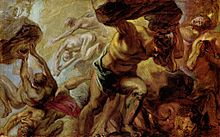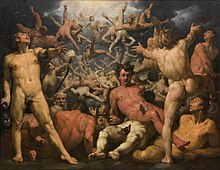Titanomachy
The Titanomachy ( ancient Greek Τιτανομαχία Titanomachía "battle of the titans") is an eleven-year war between the two gods of the titans in Greek mythology . The ancient gods, the Titans, led by Kronos , fought long before the creation of mankind from Mount Othrys with Zeus and his other siblings, the children of Rhea and Kronos, who later ruled from Olympus .
The Greeks of the Classical Age knew various chants about the war between their main gods, the later Olympians, and the older Titans.
The most important and only surviving story is the theogony of the poet Hesiod .
The lost work Titanomachia , attributed to the blind Thracian bard Thamyris , is mentioned in the essay On the Music of Plutarch .
The titans also play a significant role in the stories about Orpheus . Although only a few fragments of the Orphic stories have survived, there are interesting differences to the tradition of Hesiod.
The Greek mythology of the Titanomachy belongs to a group of myths common in Europe and the Middle East, in which one generation or group of gods battles another for supremacy. Sometimes the older group is defeated. Sometimes the rebels lose and are completely deprived of their power or become subordinate to the pantheon . Other examples are the wars of the Æsir with the Vanir and Jötunns in the mythology of Scandinavia, the Babylonian epic Enuma Elish , the Hittite Kumarbi narrative ( kingship in heaven ), which reached after fights integration of Baal in the Ugaritic Keret myth and the Judeo-Christian Traditions about the fallen angel.
The history
prehistory
Uranus (heaven itself and ruler of the cosmos), the husband of Gaia (the goddess and personification of the earth), later acquired their enmity because he had some of their common children - the Hekatoncheirs , hundred-armed and fifty-headed beings, and the Cyclops - in the Tartaros pushed back into Gaia's body, the earth, which caused her great pain.
So Gaia created a large sickle and called the titans, another family of six sons and six daughters that she had from Uranus, together to persuade her children to kill their father. The youngest, Kronos, agreed. So she gave him the sickle and he lay in an ambush.
When Uranos met Gaia, Kronos attacked Uranos and cut off his genitals with a sickle. From the blood or, according to other sources, the seed of Uranus, which fell to earth (Gaia) in the process, the giants , the Erinyes and the Meliads were begotten.
Kronos now ascended the throne of Uranus, but also locked the Hekatoncheirs , the Cyclops and the newly born giants in the Tartaros.
Gaia, furious that Kronos had imprisoned his brothers as well as his father, prophesied that his own children would rebel against his rule just as he would rebel against his father's. Fearing the prophesied attack by his children, he devoured all the children his sister and wife Rhea bore him. But when Rhea later gave birth to her son Zeus , Rhea pushed a stone wrapped in a diaper (see Batylos ) under him.
She hid Zeus in a cave in the Dikti Mountains in Crete , where she secretly gave birth to him (see Psychro's cave ). In the meantime, Zeus was cared for by the goat Amaltheia and protected by the Curetes .
war
When he grew up, Zeus sneaked into Kronos and forced him to choke him out again first the stone and then all his swallowed children, the siblings of Zeus, using a magic potion that he had received from Metis .
Zeus now led his siblings, the gods Hades and Poseidon as well as the goddesses Hestia , Demeter and Hera , in the war against Kronos and the Titans. On the side of Kronos stood the titans Koios , Kreios , Hyperion , Iapetos , Atlas and Menoitios .
The titan Okeanos and the female titans Theia , Rhea , Themis , Mnemosyne , Phoibe and Tethys remained neutral .
On the advice of Gaia, Zeus slew the monster Kampe , which was guarding Tartarus for Kronos. So Zeus freed the hundred-handed Hekatoncheirs imprisoned there, who helped the Olympian gods by throwing large stones at the Titans. The Cyclops helped Zeus create his most outstanding weapon, the thunderbolt . They also forged the trident of Poseidon and a helmet for Hades that gives invisibility.
After a decade of war, the three Olympic brothers and their comrades-in-arms had defeated the Titans.
result
Then the brothers shared the rule: Zeus ruled over the sky, Poseidon over the sea and Hades got the underworld. Now the enemy titans have been locked in the Tartaros . Zeus used the Hekatoncheiren as guardians. The neutral titans like Mnemosyne retained their positions.
Atlas , Kronos , Prometheus and Epimetheus received a special punishment .
Old Uranos , Heaven, almost collapsed to earth because so much fighting had taken place there. Zeus condemned Atlas to carry heaven for all time.
According to some sources, Kronos managed to escape after the war, but was killed by Zeus with his thunderbolt.
Since then, Zeus and the Olympians have ruled the world and were able to defend this supremacy against the later attack of the giants ( gigantomachy ) also wanted by Gaia .
literature
- Reiner Abenstein: Before the reign of Zeus. In: Reiner Abenstein: Greek Mythology (= UTB . 2592). Schöningh, Paderborn et al. 2005, ISBN 3-506-71720-0 , p. 20 ff.
- José Dörig, Olof Gigon : The battle of the gods and titans (= Bibliotheca Helvetica Romana. Bd. 4, ZDB -ID 419869-4 ). Graf, Olten et al. 1961.
- Franz Fühmann : Prometheus. The titan battle. Hinstorff, Rostock 2011, ISBN 978-3-356-01388-7 .
- Christoph Martin Wieland : The Titanomachy or the new book of heroes. A burlesque poem in as many chants as you want. 1775. In: Christoph Martin Wieland: Complete works. Volume 33: Mixed Scriptures. Göschen, Leipzig 1857, pp. 389–396 .
Web links
Individual evidence
- ↑ Hesiod, Theogony 617-885

